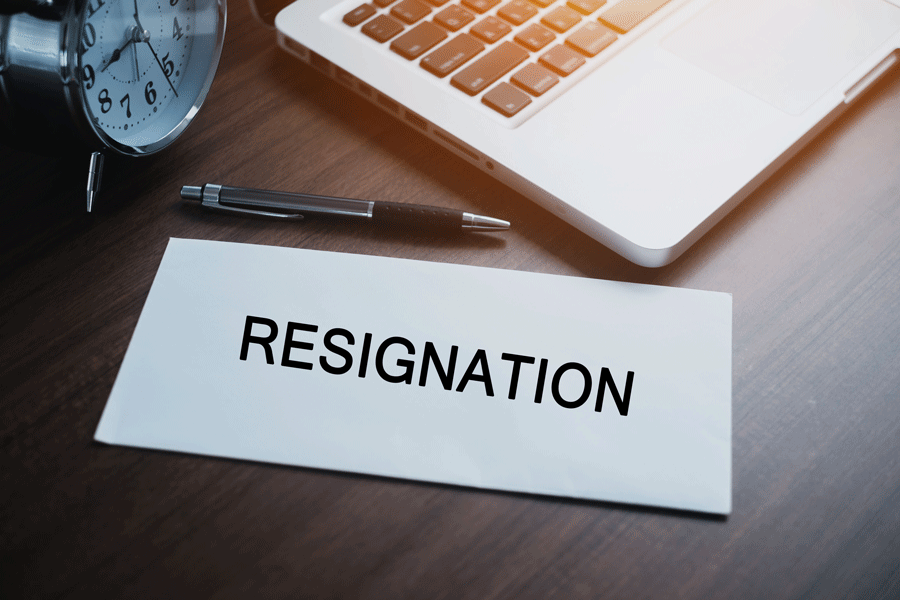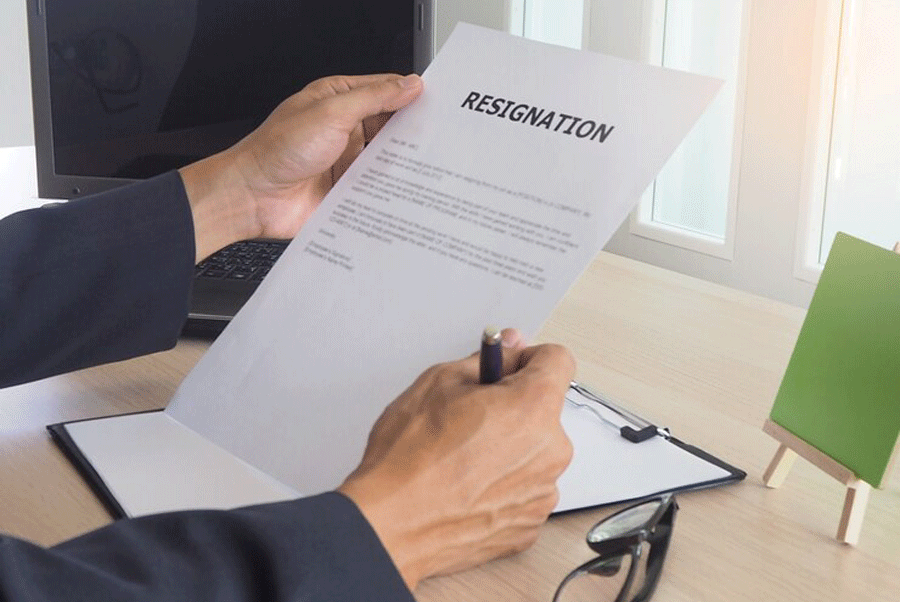A Resignation Letter is an official document that states and communicates when your employment with an organization ends, whereas a resignation letter template is a prepared letter that you can use to attain this purpose easily.
When you decide to leave a position, it’s important to communicate this to your employer as soon as possible. But, of course, the best way is with a letter. Your employer may require a formal letter. It is best to include the date of your last day of work in the letter and any other pertinent details.
Depending on your situation, you will want to submit the resignation letter at least two weeks before your last day of work. A filled template can help you leave your job on a positive note. In addition, that enables you to retain a good relationship with the company and your co-workers going forward.
Before you write your resignation letter, it’s a good idea to check with your manager or HR representative to see if your company has a required process regarding it. They may ask you to provide specific details or send your letter to certain people.
Types of Letters
There are many different reasons you may want or need to leave your position. Tailoring the letter to your unique situation can help make the transition go more smoothly for you and your employer.
Following are free templates and sample letters for different circumstances:
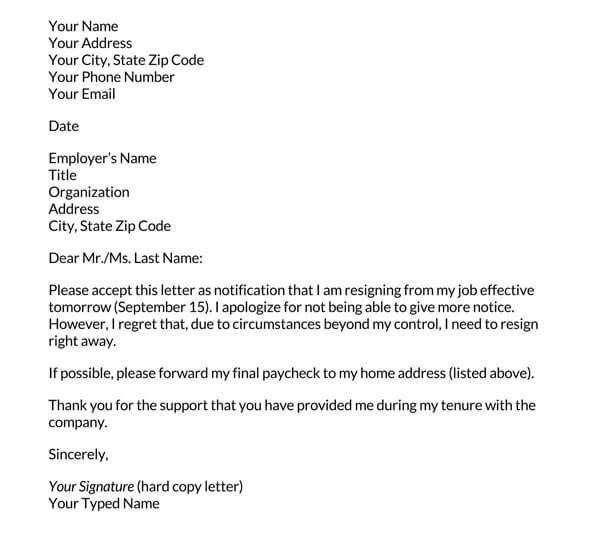
24 Hours’ Notice Resignation Letter
This type of resignation letter is written by an employee who has to reign within a day.
Download: Microsoft Word (.docx)
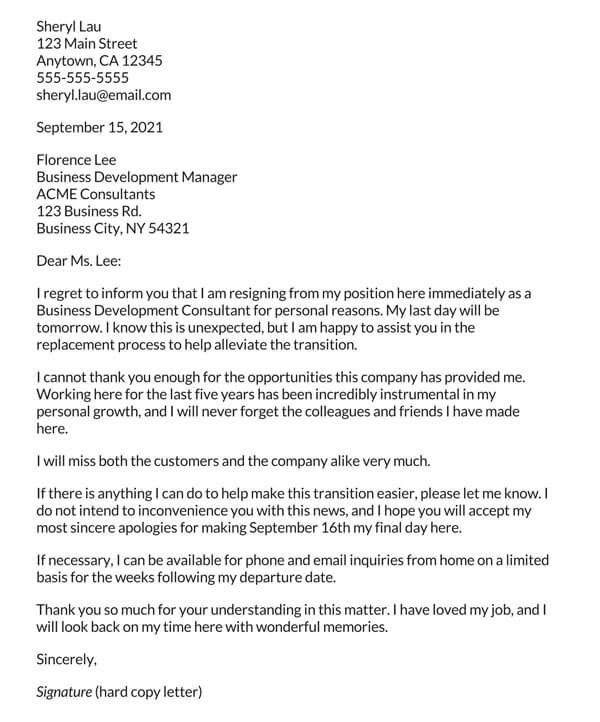
Immediate Resignation Letter
This type of resignation letter is ideal for an employee who wants to leave their job immediately.
Download: Microsoft Word (.docx)

No Notice Resignation Letter
An employee should craft this type of resignation letter if they plan on quitting their work without providing the two weeks’ notice.
Download: Microsoft Word (.docx)
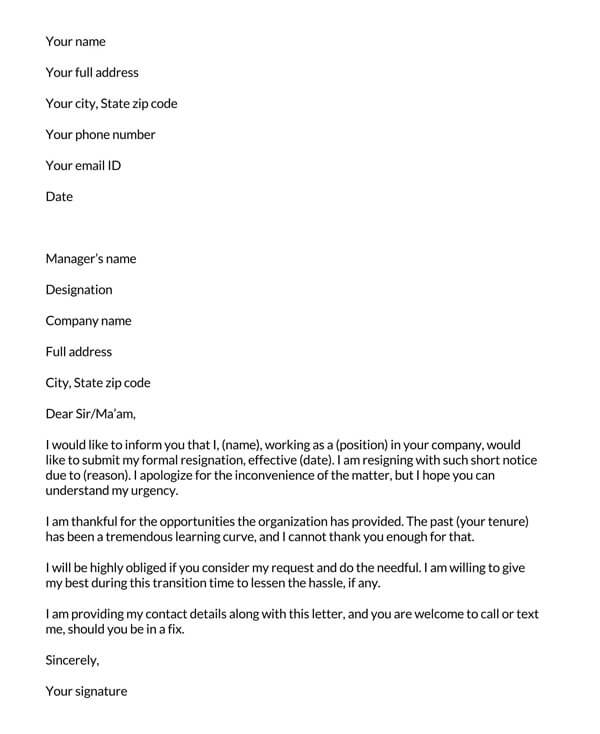
Short Notice Resignation Letter
This type of resignation letter is crafted when the employee resigning is in a position that they have to give their employer less than the required notice period.
Download: Microsoft Word (.docx)
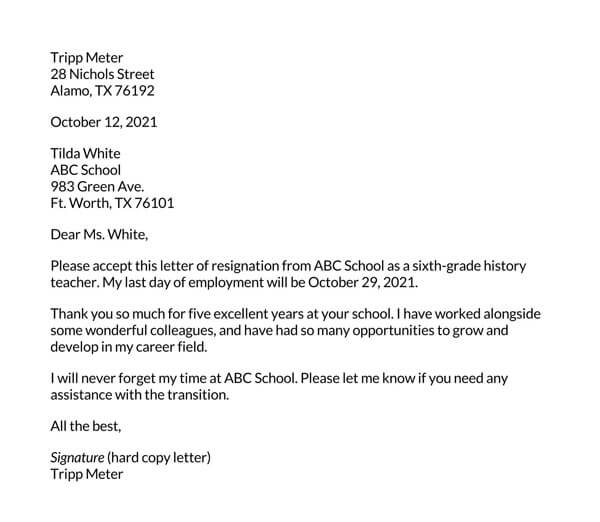
Heartfelt Resignation Letter
Many feel a genuine connection with their employers and co-workers. Therefore, it can be appropriate to write a resignation letter that conveys some of that emotion. It's always good to express gratitude, and a heartfelt resignation letter can leave your employer with a good impression of you.
Be open with praising what you appreciated about your job, your boss, and your co-workers. You could make a note of valuable skills you learned while in the position.
If possible, you could offer help training your replacement or assist with the transition in other ways. This will help you stand out as a team player, leaving a valuable impression on your manager and colleagues.
Download: Microsoft Word (.docx)
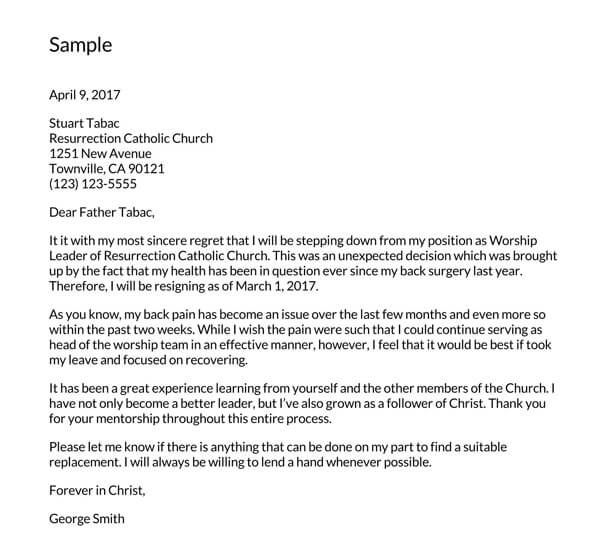
Church Resignation Letter
If a church employs you, you'll want to be sensitive and use excellent etiquette as you write your resignation letter. Keep in mind that while the letter may be addressed to your boss, it could be read by members of the congregation. Being sensitive and cheerful will help you to make your departure professional and graceful.
Make sure your letter includes an appropriate salutation directed at the correct person. State your intent to leave your position and provide your reasons. Make sure to express your gratitude for what you've learned, and the kindness shown to you by the church or church members. Offer to assist with the transition if you can. Finally, make sure the letter's close includes an appropriate sign-off, such as "Peace be with you."
Download: Microsoft Word (.docx)
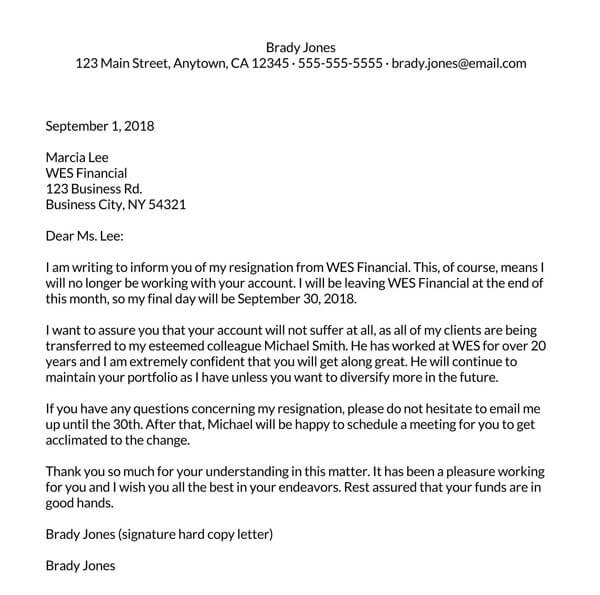
Contractors and Clients Resignation Letter
The work of contractors and clients is under different terms than those of employers and employees. Still, contractors and clients should give reasonable notice when they decide to stop offering their services. In addition, consideration must be given to how their absence could affect a company's operations or business.
When writing a resignation letter, make sure to consider the terms and conditions of your contract. And because you may want to work with the company or person in the future, it's crucial to resign in a professional and considerate way.
There will be substantial differences between a resignation letter from an employee versus a contractor or freelancer. Sometimes, a contractor may only need to let the employer know that they will no longer offer their services. At other times, they may need to give advanced notice.
Download: Microsoft Word (.docx)
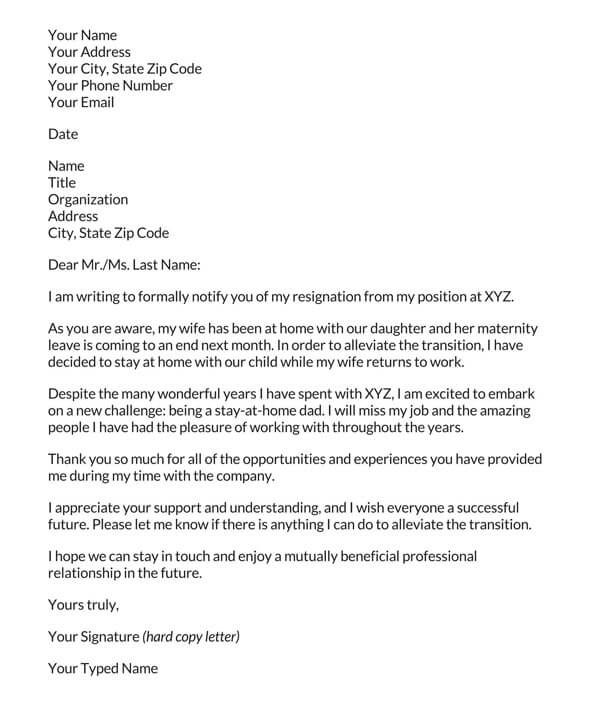
Stay-At-Home Resignation Letter
On many occasions, employees need to leave their positions to stay at home, such as caring for children, health concerns, marriage, or other family issues. A resignation letter due to stay-at-home reasons should address the reason for your departure.
Make sure to note the date your resignation will take effect, ideally at least two weeks in advance. This will give your employer adequate time to prepare for your departure.
Be honest about your reason for leaving to avoid confusion or ambiguity with your employer or co-workers. Expressing gratitude is always a good idea. Being professional and going in good conscience make it possible for you to return in the future if you would like to.
Offering to help with the transition is always a good idea.
Download: Microsoft Word (.docx)
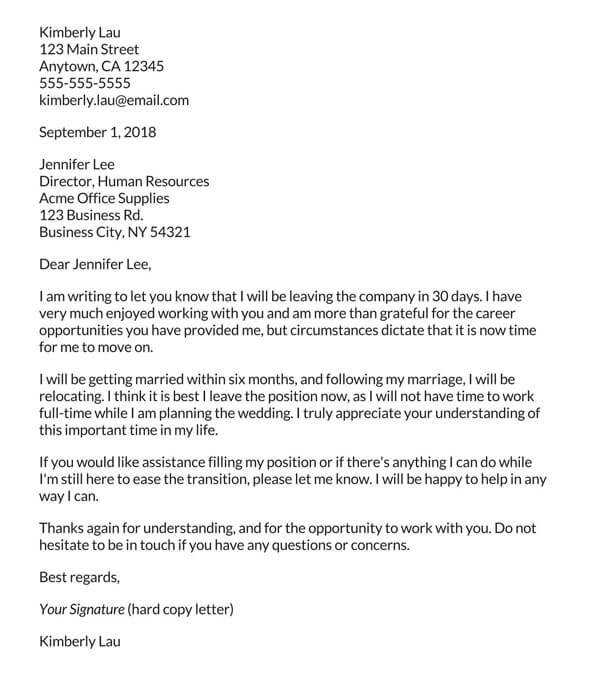
Marriage Resignation Letter
Download: Microsoft Word (.docx)
Below is a table with different types of templates that an employee may need:
Writing a Letter
Writing this letter may be part of an extensive process that holds some difficulty. Still, the letter itself can be very straightforward. However complicated your feelings about leaving your job, remember that brevity and clarity are your best friends when crafting the letter.
The following are the parts of the letter:
Header
The header for a hard copy letter will include the date, your contact information, and the business name and address. Use standard business letter format if you plan to submit in hard copy.
If you’re submitting it via email, you don’t need to use the business letter format.
Salutation
Use a standard greeting at the beginning, i.e., “Dear [First name].”
Body
Write that you’re submitting your formal resignation and when your last day will be. Two weeks’ notice is standard but checks to see if your company has specific instructions regarding an employee’s last day at work. Give the reasons briefly and respectfully. Then, write a statement of gratitude – at least two sentences expressing what you’ve been thankful for at the job.
You can also offer to assist with the transition process. This gives a cheerful ending to your experience with the company, increasing the likelihood of receiving a good letter of recommendation. This could also keep the door open if you’d like to return to the company in the future.
Conclusion
At the end of the letter, mention any specific details that may be vital for the transition. Next, give a brief departing statement, a final thank-you, and then a sign-off with “Sincerely,” or Thank you,” along with your name.
Template Resignation Letter
[Your Name]
[Your Address]
[City, State, Zip Code]
[Email Address]
[Phone Number]
[Date]
[Recipient’s Name]
[Their Professional Title]
[Company Name]
[Company Address]
[City, State, Zip Code]
Dear [Recipient’s Name],
Subject: Resignation from [Your Position]
I am writing to formally announce my resignation from my position as [Your Position] with [Company Name], effective [Last Working Day, typically two weeks from the date of the letter].
This decision was not made lightly and involved considerable reflection. I have had the opportunity to grow both personally and professionally here, and I am grateful for the valuable experiences and support I have received during my tenure. Working alongside such a dedicated team and under your leadership has been a highlight of my career.
Reason for Leaving (Optional):
While it’s not mandatory to include a reason for your departure, you might choose to share a brief explanation if it’s positive and constructive, such as pursuing a new opportunity, personal growth, or other professional reasons.
Transition Support:
I am committed to ensuring a smooth transition and am prepared to assist in any way possible during my remaining time. This includes training my replacement, documenting my current projects, and completing any outstanding tasks to the best of my ability.
Gratitude and Reflections:
I want to express my sincere gratitude for the opportunities to develop and contribute to [specific projects, teams, or initiatives]. The skills and knowledge I’ve gained here will undoubtedly serve me well in the future. I am especially thankful for the support and mentorship from you and my colleagues, which have been invaluable to my professional growth.
Future Contact:
As I move on to the next chapter of my career, I hope to stay in touch and perhaps collaborate in new capacities in the future. Please feel free to reach out to me at [Your Email Address] or [Your Phone Number].
Thank you again for the opportunity to be a part of [Company Name]. I look forward to ensuring a seamless transition and wish the company continued success in all its endeavors.
Warmest regards,
[Your Name]
[Your Position]
Sample Letter
Dear Ms. Doe,
I am writing to formally announce my resignation from my position as Graphic Designer at Innovative Designs Inc., effective two weeks from today, with my last day being March 21, 20XX. This decision was made after much deliberation and reflection on my career goals and personal aspirations.
Over the past three years at Innovative Designs Inc., I have been fortunate to work on a multitude of challenging projects that have not only pushed me to enhance my design skills but also allowed me to contribute to the company’s success. The “Rebranding Initiative” project remains a highlight of my tenure, where our collaborative efforts led to a significant uplift in the client’s market presence and, subsequently, their revenue. It was projects like these that made my time at Innovative Designs Inc. incredibly rewarding.
I am deeply grateful for the mentorship and support provided by you and the entire team. The creative environment and the opportunity to work alongside such talented individuals have been instrumental in my professional growth. While I am excited about the next chapter in my career, the decision to leave was not easy, given the strong professional relationships and friendships I have developed here.
To ensure a smooth transition, I have taken the following steps:
- Completed all my current design projects to the best of my ability.
- Prepared detailed documentation and guidelines for ongoing projects to assist my successor.
- Available to provide training or support to the incoming Graphic Designer to ensure a seamless handover.
- I hope to maintain the connections and friendships made at Innovative Designs Inc. and would love to stay in touch. You can reach me at my personal email, carter@email.com, or by phone at 055123457.
Thank you once again for the opportunity to be a part of such a dynamic team and for the invaluable experiences I have gained during my tenure. I wish Innovative Designs Inc. continued success and hope our paths may cross again in the future.
Warmest regards,
Emily Carter
Tips for Writing
There are many reasons for leaving a job. Still, no matter the reason, it’s vital that you communicate your decision to your employer positively and respectfully. Such a letter should be professional and should not include complaints about the company, the manager, or your co-workers. Keep the tone of your writing calm and professional.
Here are some general tips:
Write positively
Your goal should be to leave the company on favorable terms. Think long-term – you need a good letter of recommendation, and it’s also possible you will want to return to the company someday. If you continue working in the field, it will help if the network hears good things about you.
It’s also a good idea to focus on what you’ve learned during your tenure with the company. By reviewing your records and thoughts to gather this information, you may realize the job has been more valuable than you realized.
Deliver your letter in person
It could be best to deliver the letter to your boss or manager in person. This will ensure that they receive the news first and will give you both a chance to talk. This is another opportunity for you to shine with positivity. Be sincere, but also express gratitude.
After your meeting, it’s a good idea to send an email right away with a clear subject line, i.e., “Resignation – [Your name].”
Consider networking opportunities
Try to view the process of resigning as part of an ongoing professional relationship. The language should make it clear that you would like to keep in touch with your manager in the future. Stress what you’ve learned from them and how grateful you feel. Include your personal email address and invite them to reach out in the future.
Keep it brief
Suppose there have been unpleasant issues at your company that led to your decision to resign. In that case, it will be okay to leave out details about the situation. You can write your statement on the date of your last day of work. End with something simple and positive, such as, “I wish the company much success in the future.”
Avoid complaining
It’s not appropriate for you to explain what you have disliked about the job, the company, or your co-workers. Instead, now is the time to focus on your future. Being positive as you leave your job is one way to impress people at your company. This will increase your chances for positive recommendations within your field and other positions.
Plan for an immediate departure
At times, an employer may request that you leave your job the same day that you resign. If your new employer doesn’t start for a few weeks, you might be unpaid for that period.
If this could apply to you, try to gather information to find out what has happened to others who’ve resigned under similar circumstances. This could help you plan when you are determining a start date with your new employer.
Follow your manager’s instructions
After you’ve submitted your resignation, your manager may request that you make a transition plan.
EXAMPLE
Projects you’ve been involved with may need to be completed or comprehensive instructions prepared for another employee.
In addition, writing goodbye notes or emails to co-workers is a kind gesture and a chance to let people know how much you’ve enjoyed working with them.
Moving into the Future
While leaving a job can be fraught with stress, your resignation can be a well-planned and positive step away from your job toward something new. You can look back at everything you’ve learned while on the job and positively express gratitude. This will give you a springboard into your future.





